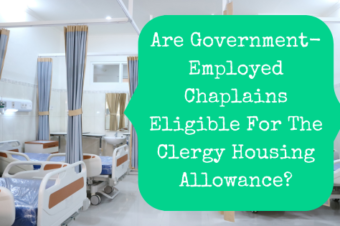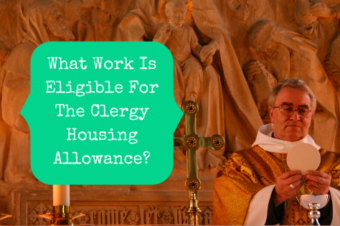
If you’re a pastor, you know that your ministerial housing allowance is perhaps the biggest financial benefit of being in the ministry. It allows you to avoid paying taxes on all of your housing expenses, including things like cable television and landscaping.
Because of this, one of the most common questions pastors ask is if they can keep taking a housing allowance in retirement. The answer? It depends on where your money is coming from. Unfortunately, one of the most common pieces of advice that professional financial advisors give could actually disqualify you from taking a housing allowance in retirement.
What Financial Advisors Commonly Recommend
Upon retirement, most financial advisors will recommend that you roll any workplace retirement plans, like 403(b)s or 401(k)s, into an IRA. They tell you to do this because you have more control over your money, more investment options, and lower fees in an IRA. If you convert it to a Roth IRA, you have the added benefits of no required minimum distributions and favorable withdrawal rules for your beneficiaries. However, you will have to pay taxes upon conversion.
While this is solid financial advice for most people, it can be a really bad idea for pastors. To learn more, I discussed it with Ben Wacek, Certified Financial Planner® and Founder of Guide Financial Planning. He has attracted a lot of pastors as clients because of his biblically-based financial guidance, lack of asset minimums, and ability to work virtually with clients all over the country. Because of this, he knows the ins and outs of ministerial housing allowances.
Taking A Ministerial Housing Allowance In Retirement
“Withdrawals from a retirement savings account can only be counted as housing allowance if withdrawn from a qualified church retirement plan,” Ben explained to me. “Revenue ruling 75-22 is the main supporting ruling that ties back to IRS Code Section 107, which is then further supported by the Housing Allowance Clarification Act of 2002.” What he is saying is that you can’t take a housing allowance from an IRA or a 401(k) from a secular job. Because of this, it is best for pastors to keep their money in their church’s 403(b) or 401(k) plan.
In fact, if you have some of your pastoral income saved in an IRA, you should try to roll your IRA into your 403(b)! Most 403(b) plans allow you to roll in outside IRA accounts. That way, your IRA money would be eligible to be used as a housing allowance as well. If you receive a fixed pension through your denomination in retirement, it can also be counted as a housing allowance.
Work With An Advisor Who Understands Pastoral Finances
Having this discussion with Ben reminded me of the importance of working with financial professionals who understand pastor-specific issues. The housing allowance is just one example of how financial planning for pastors isn’t the same as financial planning for everyone else.
Just like my friend who had her taxes messed up by H&R Block because they didn’t understand how some church employees have to pay self-employment taxes, a financial advisor that doesn’t understand the rules surrounding housing allowances could really cost you a lot of money. As Ben told me, “This strategy is a big deal and one that pastors definitely want to be aware of. For example, if a retired pastor is in the 25% marginal tax bracket and they take total withdrawals from their retirement account of $20,000 in a year, this opportunity could save them $5,000 in taxes every single year of retirement!”
Don’t miss out on the chance to take a housing allowance in retirement. Put money into your 403(b) while you’re working and keep it there when you retire. And if you get outside financial advice, make sure it is personalized and takes into account your position and unique opportunities as a pastor.




14 Responses
Evan Avery
December 16, 2019Great article – thanks for sharing! It is my understanding that pastors have the ability to claim the allowance on these withdrawals because the funds were saved during their time as a minister. It seems that “rolling” an outside IRA into a church retirement plan (in order to capture the housing allowance on withdrawals) could be seen as a manipulation of the tax code, even if it is never explicitly disallowed by any official ruling. How would you respond to the ethical dilemma presented by this question? For example, how would you respond to a corporate attorney who became a pastor for a year, consolidated all his retirement assets into the denominational 403(b)9, and then qualified for the housing allowance on withdrawals for the rest of his life?
Amy
December 16, 2019That is a very good question. When I mentioned rolling an IRA into a church 403(b) plan I was thinking of pastors who had been saving in an IRA as a pastor before their church offered a qualified plan (or before they began participating in one). My church just established a 403(b), so for a long time the pastors were only able to save into IRAs. In their case, there would be no ethical dilemma because all of the money in their IRAs was compensation from ministerial services.
However, in your example of an attorney I agree that it is not ethical to roll non-ministerial earnings into a church plan just to avoid taxes on his housing expenses. I will edit the article to make it more clear.
Joe Griffith
December 26, 2019Amy,
Have you written any articles on the pros and cons of buying a home vs. renting once a pastor retires? If a pastor is about ten years from retirement age, what should he/she be considering at this point about buying a home? It seems that perhaps renting would provide greater flexibility for moving from one place to another or for long-term travel such as RV trips. In terms of leaving an inheritance to children, would owning or renting a home be easier, or more cost-effective? Thanks for any insight into this topic!
– Joe
Amy
January 1, 2020I don’t have any articles that cover that but I think it’s a great idea. I will start working on it.
Bill
February 17, 2020Hello Amy
Thanks for all the material, I’ve read quite a bit of your stuff and enjoyed. While I’m not in the ministry, I have relatives who are.
My church is looking into setting up a 403(b) plan. Do you know if all church plans are 403(b)(9) plans by default? Is that the best recommendation? Do you know about minister (RIA) retirement income accounts in relation to a 403(b)(9)?
I’ve seen Vanguard has 403(b) services. Are they a good choice? Or do you have any recommended resources (other than the financial advisor you mentioned here)
Regards
Amy
February 24, 2020Bill, I would recommend that you find a pension specialist that works with churches to help you and answer all of your questions. It is my understanding that all 403(b)s set up by churches qualify as 403(b)(9)s and IRAs are no different for ministers as they are for anyone else. However, I am not a pension specialist, so please don’t take this as legal or professional advice. Also, I am not familiar with the different providers and cannot offer resources other than the financial advisor named or the Internal Revenue Code itself: https://www.law.cornell.edu/uscode/text/26/403
Noah Brown
March 8, 2022Amy,
This is great! In the quote from Ben, he mentioned that BOTH a 401(k) and 403(b) can give housing in retirement if administered through the proper sources. I was always under the impression that only 403(b)s (403b9s or pensions administered through a denomination or associated with a group of churches through a pension board to be precise) could give housing as they have non-ERISA designation. Is there some clarification or precedent as to the types of accounts that are able to give housing in retirement? Thank you so much as we try to get this right 🙂
Amy
March 13, 2022Noah, the requirement is that it is a church retirement plan, not specifically a 403(b). That is necessary to prove that the money in the account came from ministerial services, which is a requirement to claim the housing allowance. Most churches go with 403(b)s in order to avoid ERISA and the administrative burden that comes with it, not specifically for housing allowance reasons. The IRS has not (and likely won’t) provided a specific list of accounts, but it’s generally accepted that IRA accounts do not qualify for the housing allowance in retirement.
Phillip R Thorne
March 12, 2022This is a helpful article; but I have one question: When the Free Church prepares a 1099 for retired pastors who withdraw from their 403b for housing, they leave the taxable amount of the distribution undetermined. Therefore, the IRS receives a 1099 which does not clearly designate the distribution as housing. How does file the 1099 so that it 1) is clearly indicated as non-taxable and 2) is not likely to be audited? Note: using a tax filing service like TurboTax of TaxFreeUSA.
Amy
March 13, 2022Phillip, usually you would include a statement explaining that a portion of the distribution was taken as a housing allowance with the proper calculations. I’m not exactly sure how you do that with the different tax software, but you could ask their customer support.
WK
December 8, 2023Can housing expenses be taken tax free from a 403b if you retire out of the US and have no US housing expenses?
Amy
December 20, 2023WK, I don’t think that is specifically addressed by the IRS anywhere. The law says that the housing allowance is to “provide a home” but doesn’t say anything about the location of the home. You will have to make a judgment call, but personally I would be comfortable claiming a housing allowance from retirement funds for a home located outside of the US.